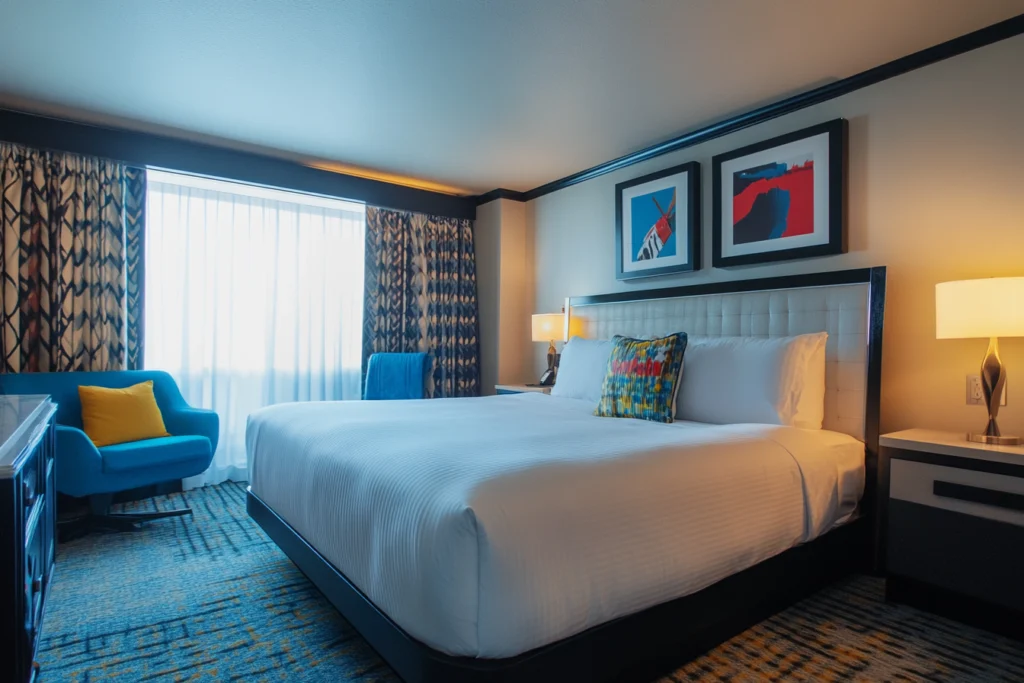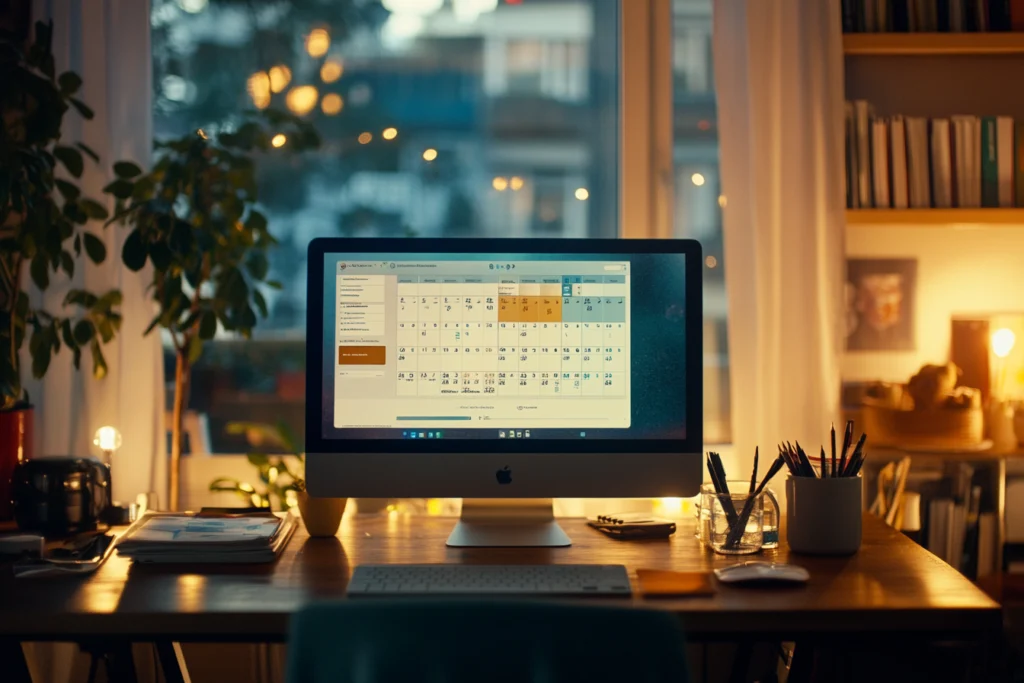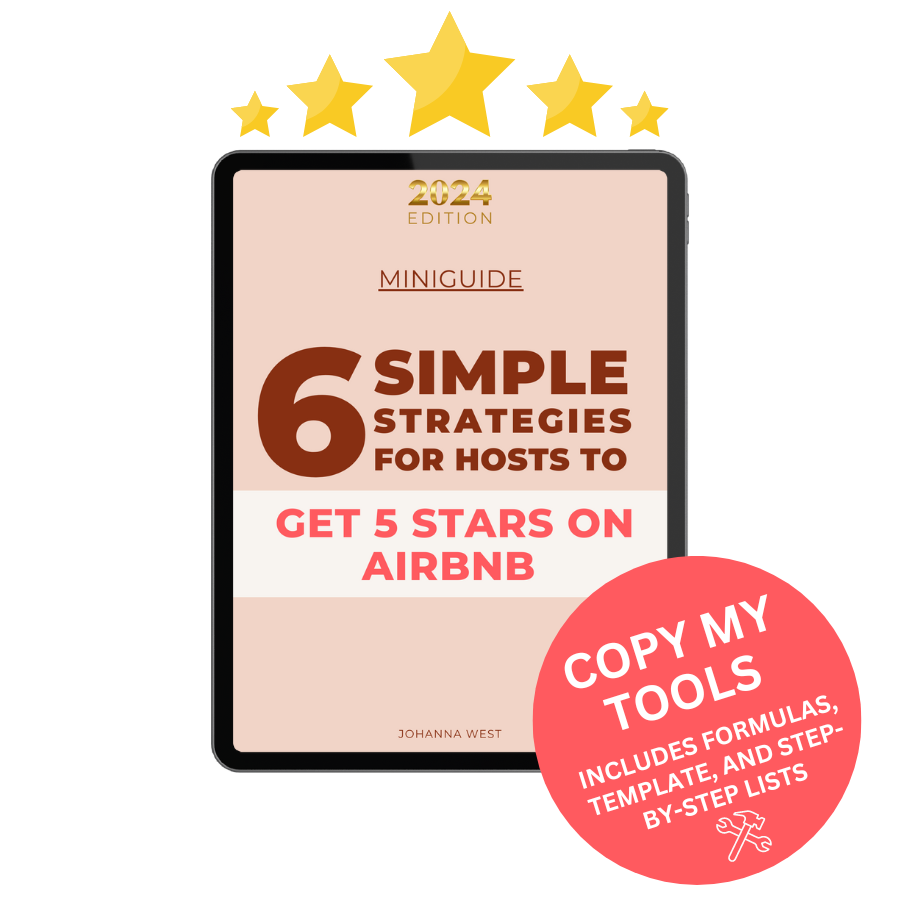If you’re wondering “how do I start an Airbnb?” This is where you start.
I had been an Airbnb guest for about 10 years before I decided to start my own Airbnb. I kind of thought I was prepared for this. But running an Airbnb is a long, long list of to-dos that guests don’t really think about. It’s really about managing a real business and crafting an experience guests will remember (and pay good money for).
This starting Airbnb guide covers what I wish I’d known before listing my first property.
Table of Contents
1. Understanding Airbnb hosting
What is Airbnb hosting?
Simply put, it’s when you rent out a part of / or your entire home to travelers. These might be people who just don’t like hotels, who are looking for a more personal touch to their stay, or who need extra amenities hotels don’t have (like a kitchen or washer). Sometimes, it’s about finding a cheaper place to stay, especially when we’re talking about renting a room on Airbnb.
But ever since short term rentals became super competitive, Airbnb prices for entire homes (from apartments to houses) have pretty much exploded. So now, when you start an Airbnb, it’s really about offering more than hotel rooms while also providing top-notch hospitality. From the moment people look at your listing to the time they check out, everything you do should aim to make their stay memorable.

What to know before you start an Airbnb business
I think it’s important to be honest about the pros and cons of Airbnb hosting. This thing isn’t just about making some extra cash on the side. It actually takes lots of work to generate a decent revenue hosting through Airbnb. So your goal should not be an extra few peanuts each month.
If you’re going to put in the work, that means you should really like the aspect of sharing your space and your city with the world. I’ve met people from all over and shared stories over coffee that I never would have heard otherwise. You will honestly learn a ton about customer service and how to manage a small business. Which brings me to another point: you can’t be afraid of the whole business aspect of it.
2. Planning your Airbnb business
For many people, this is the least fun part. But there are a lot of factors (and price tags) to consider before starting an Airbnb and having a solid plan will save you from many headaches. The first time I set up my listing, I overlooked simple things like dynamic pricing.
Do some market research!
Who are your competitors? What are they offering? How much are they charging? I booked myself a couple of Airbnbs in my area to understand what guests were getting for their money. This helped me learn from others and improve my offering — not too pricey to scare people off, nor too cheap to undervalue my place.
Are prices in your area supporting the investment you’ll need to make? Tools like AirDNA can help you crunch these numbers before committing.
The best location to start an Airbnb
I hate to quote realtors here but I have to. Location, location, location—it’s a cliché because it’s true.
My first property was a beautiful apartment in a quiet residential area. It was modern and beautifully designed, but guests often wished it was closer to the action. When I later switched to a spot near downtown, my bookings doubled.
This will depend on what guests you want to attract, but in my case there wasn’t really much to do in the area the apartment was in. Ask yourself: what are guests in your area looking for? Business travelers want convenience to offices. Tourists want proximity to attractions. Families need space and safety.
Look for places that are not only nice but also convenient.
3. Legal considerations
I told you some stuff wasn’t going to be fun, this is another one of them. But ticking off legal boxes means you’re setting up your Airbnb the right way (and saves you a lot of hassle in the future).
Local regulations and permits
Start by researching:
- Zoning laws (check with your local city hall)
- Short-term rental permits (many cities now require these)
- Business licenses (some areas consider Airbnb a business activity)
- HOA or landlord restrictions (if applicable)
I skipped getting a proper permit in my first month. The $500 fine taught me an expensive lesson.
Insurance
If you’re a homeowner, you might think your home insurance is enough. But I recommend getting short-term rental insurance as well. Airbnb’s Aircover is notoriously unreliable in reimbursing hosts for guest damages. Short term rental insurance ranges from roughly $1000 to $4000 per year.
This should go in your planning budget when you decide whether or not it’ll be worth going into Airbnb hosting.
Think about taxes
You’re about to enter a new tax situation. Start preparing now:
- Track all income and expenses
- Set up a separate bank account for your Airbnb business
- Consider registering an LLC for liability protection
- Save 25-30% of profits for taxes
- Research local occupancy taxes you may need to collect
Meeting with an accountant who knows short-term rentals is really helpful. Mine showed me thousands in deductions I would have missed otherwise.
4. Budgeting and expenses
From furniture to utility bills and the occasional repair, costs can and will add up quickly. I keep a detailed spreadsheet that tracks every penny spent and earned. It’s not the most exciting part of my day, but it keeps me in the black, which is always a good place to be!
If you’re smart and serious about hosting, you’ll work out the finances before launching into this Airbnb journey (to see what kind of earnings you’d be looking at).
Startup cost
For a standard one-bedroom apartment, expect initial costs between $5,000-$15,000. Here’s where that goes:
- Furniture: $2,000-$5,000
- Kitchen setup: $500-$1,500
- Linens and towels: $300-$800
- Electronics (TV, speakers): $500-$1,000
- Smart home devices: $300-$800
- Décor: $500-$1,500
- Professional photos: $200-$500
- Deep cleaning: $200-$400
- Permits and licenses: $100-$1,000
- Buffer for unexpected expenses: $1,000
I’d recommend to focus on essentials first and upgrade as income comes in.
Ongoing expenses
Your monthly costs will include:
- Mortgage/rent
- Utilities
- Internet/cable
- Cleaning fees
- Supplies replenishment
- Maintenance (budget 5% of revenue)
- Platform fees (3% on Airbnb)
- Insurance
- Property management (if using)
Remember: Your actual profit is what’s left after these ongoing expenses, not just the nightly rate minus cleaning fee.
So, what are my Airbnb profits?
Any time I talk to someone who’s looking into starting a short term rental, they ask “What can I earn with my Airbnb?” While earnings vary by location, property type, and your management style, here’s a framework to estimate:
- Research average daily rates (ADR) in your area for similar properties
- Assume 60-70% occupancy for a well-run property (lower at first)
- Calculate gross annual revenue: ADR × 365 × expected occupancy
- Subtract all expenses (both fixed and variable)
- Result: Your estimated annual profit
My first property took three months to reach profitable occupancy levels. Don’t expect instant success!
5. Setting up your Airbnb
If the numbers look good to you, the fun part actually begins. I find setting up your Airbnb is the most exciting part of the process. This is where your inner designer gets to shine (and mine is very passionate about this). Keep in mind that making your space inviting is more than just choosing a couple of throw pillows or reusing some furniture you keep in storage.
Ever wonder why hotel rooms are laid out the way they are? They’ve been optimized over decades for guest comfort and practical use.Consider the guest journey through your space. Where will they put suitcases? How easily can they find essentials? Is the Wi-Fi password clearly visible?
Design and furnishing tips
I find that being consistent with your interior design is probably the most important rule to remember. I don’t care whether you’re going for a Harry Potter theme or a contemporary look – make sure the theme covers your entire space. I personally like it when the interior design is inspired by local art and culture, my Airbnb features some designs by local artists. Guests love this because it feels authentic. If you’re near a beach, you can totally go for a beach vibe. Cabin in the mountains? You know what to do.
Yes, comfort is key. High quality beds, good lighting, and plenty of charging stations are must-haves. But a special touch can really make your place unforgettable!
Essential amenities to include
Fast and free Wifi tops the list of almost everyone’s needs. From experience, I can also say that a “fully equipped kitchen” does not equal a fully equipped kitchen. In almost every Airbnb I stayed in as a guest, these kitchens were missing basic utensils like a colander or a cutting board.
If you want to go the extra mile, you can also consider including little luxuries like makeup towels, complimentary toiletries, or a welcome basket with local treats. These small touches can have a big impact on how guests review your Airbnb.
The best tip I can give you here is: have a friend spend a few nights in your Airbnb before listing it. That way you’ll know what works (or doesn’t), and what might still be missing to make a stay comfortable.
6. Creating a great listing
Now that you’ve got the actual Airbnb ready for guests, it’s time to show it to the world. Consider your listing your “storefront.” A great listing will make people notice it, click on it, and then book it. In that order.
The three-part formula
Getting bookings happens in three steps:
- Get the click (thumbnail, title, price)
- Hold attention (photos, quick facts)
- Close the sale (detailed description, amenities, reviews)
If you fail at any step, you lose the booking. Let me explain.
Getting the click depends on the picture you chose as a thumbnail, your listing title, and your chosen price. These will be the first three factors that will lead to someone even looking at your listing in more detail (= goal number 1).
Then, you’ve got to make sure the rest of the content hits home too (pun intended). Guests will start browsing photos and making sure the property checks off all their needs (your Airbnb features). Now, you’re holding their attention.
Finally, they’re going to spend a bit more time reading your detailed description, reviews, and your profile. When they feel they can trust the place (and you as a host), they’ll book it.
Invest in high-quality photos
I can’t stress enough the importance of high quality photos – that’s what guests will notice first and most care about. Professional photos increased my bookings by 40%. This is not the place to save money!
A professional photographer ($200-400) knows how to:
- Use wide-angle lenses without distortion
- Capture spaces in natural light
- Stage rooms to look spacious and inviting
- Edit photos for consistent brightness and color
Include 20-30 photos showing every room from multiple angles. Spotlight special features and amenities.
Writing your listing description
Your description needs to balance information with storytelling. Why is your place special? What unique experiences can guests enjoy?
Start with a compelling summary paragraph that paints a picture of the experience. Follow with detailed, scannable sections covering:
- Space details (square footage, layout, beds)
- Special features and amenities
- Neighborhood highlights
- Transportation options
- House rules (briefly – details come later)
- Guest access information
Use short paragraphs and bullet points. Most people skim rather than read.
Pricing strategy
We already talked about looking up your competition when you’re doing your market research before starting an Airbnb. So you should have an idea of the going rate in your location. But don’t stop there. Consider:
- Seasonal demand in your area
- Local events and conferences
- Weekday vs. weekend differences
- Length-of-stay discounts
- Special offer promotions
I also recommend trying out a dynamic pricing tool. These tools can increase your revenue by 20-30% compared to fixed pricing. Start slightly below market rate to build reviews, then increase prices as your reputation grows.
7. Managing your Airbnb
Once you’re up and running, managing your Airbnb can become a full-time gig. I initially thought setting up the place would take a lot of work, and then I’d just be handling a few emails or notifications. But the job also includes overseeing customer service, housekeeping, and even a bit of conflict resolution.
Managing an Airbnb efficiently means creating systems. Some of the best Airbnb hosting tips I’ve learned involve automating as much as possible.
Consider co-hosting and automation tools
If you’re just getting started, I think it’s essential you handle most if not all the tasks yourself in the beginning. This ensures you know your business inside and out, and can then make an informed decision of outsourcing some tasks.
That being said, when you feel you know the gig, co-hosting could be a good option to offload some tasks like guest vetting, cleaner scheduling, routine checks, and customer service. I also recommend using Airbnb’s auto-messaging tools, where you can set up a specific sequence of messages sent to guests who have booked your place. Think: thank you for booking, preparing for their stay, check-in instructions, check-out instructions.

Guest check-ins and check-outs
Self-check-in via lockbox or smart lock can be a lifesaver. It gives your guests the flexibility to arrive on their schedule and frees you from being on call 24/7. Just ensure you’re available via phone or message in case they hit a snag.
Handling guest issues
Problems will happen, it’s inevitable. The way you respond will determine whether they become negative reviews.
The golden rule is to respond immediately with empathy and a solution.
For common issues, have ready solutions:
- Wi-Fi problems (reset instructions, backup hotspot)
- Appliance failures (usage instructions, service contacts)
- Comfort issues (extra heaters/fans, additional linens)
- Noise complaints (white noise machines, earplugs)
When something goes seriously wrong, offering compensation before guests ask for it turns a negative into a positive review opportunity.
Maintaining your property
Regular maintenance not only keeps your property in top shape but also ensures guest safety. I schedule a deep clean and inspection after every few stays to ensure everything is up to scratch. By giving my Airbnb a proper “quality sweep” on a monthly basis, I avoid problems down the road.
8. Marketing your Airbnb
You’ve set up a killer Airbnb, but now you need people to find it. This is where your marketing savvy comes into play.
Fully using Airbnb’s platform
Make the most of Airbnb’s tools—make sure you complete your listing information, your profile, engage with reviews, and use their promotional features. The more active and responsive you are, the more visibility your listing gets. While Airbnb’s algorithm never stays the same, applying common SEO techniques always helps rank better in searches.
Beyond Airbnb: using social media
Now if you want to take it one step further, you can head to social media. Some Airbnbs have a dedicated Instagram, TikTok or Facebook page. You can share behind-the-scenes content, guest reviews, and special promotions. It’s also a great way to connect directly with potential guests. Not everyone will have the time to do this, which is my case at the moment. But I plan to experiment with this in the future.
Multi-platform strategy
You could list your property on multiple platforms to maximize visibility:
- Airbnb
- VRBO/HomeAway
- Booking.com
- Expedia
- Direct booking website
But keep in mind that you want to avoid double-bookings. So you’ll need to figure out a way to keep your calendars synced. There are tools like Hospitable or Your Porter that can help with that.
Gathering and leveraging guest reviews
People love reviews. Everyone will hunt down reviews before investing in anything, a new car, a job, a new pair of sneakers, or an Airbnb. Positive reviews are gold. Encourage happy guests to leave a review by leaving a reminder in your Airbnb or sending a thoughtful follow-up message. And if you get a negative review? There’s only one way to respond, and that’s by being professional. It shows future guests that you’re committed to providing a great experience.
9. Troubleshooting common challenges
Every host I’ve met has faced more than one challenge. Here’s how to handle the most common ones.
Difficult guests
Not all business is good business. There are some guests you’ll want to avoid. Watch for signs like:
- Vague booking purposes
- Local guests (who might be planning parties)
- Brand new accounts with no reviews
- Last-minute weekend bookings
Trust your instincts – that feeling in your gut is often right.
When issues do arise during a stay, respond quickly and professionally. Always reference your house rules when necessary. I’ve found that addressing problems immediately prevents them from escalating into bigger issues. Document everything with photos and messages within the Airbnb platform – this creates a record if you need to involve Airbnb support.
Know when to offer refunds and when to stand firm. Sometimes a partial refund solves a problem efficiently, but consistent boundary-setting is important too. I once had a guest ask for a full refund because the weather was rainy during their summer vacation. That’s when polite firmness is necessary.
Maintenance emergencies
Build your network of service professionals before you need them. I keep contacts for:
- 24-hour plumber
- Electrician
- HVAC specialist
- Locksmith and general handyman
- Backup cleaning service for emergency turnovers
Set aside a maintenance fund for unexpected repairs – ideally about 5% of your annual revenue. This prevents emergency repairs from destroying your profit margins. When my water heater failed at 10pm with guests arriving the next day, having both emergency funds and a reliable plumber saved me from a bunch of cancellations.
Seasonal challenges
Different seasons bring different challenges. Summer often means AC issues, higher water usage, and outdoor space maintenance. Winter brings heating problems, snow or ice management concerns, and holiday pricing decisions. Shoulder seasons typically mean occupancy drops that require adjustment of minimum stays and special promotions.
Create seasonal maintenance checklists and adjust your pricing strategies accordingly. I do HVAC maintenance before peak seasons, deep clean outdoor spaces in spring, and check all heating systems before winter. Being proactive saves you from emergency calls and negative reviews.
Managing negative reviews
When you get a negative review (and you will!) it’s important to regroup. Here’s my 5-step process:
- Don’t respond immediately – take time to cool down
- Address specific points factually without getting defensive
- Highlight any changes you’ve made based on the feedback
- Keep your response professional and brief
- End on a positive note
Potential guests read reviews, and how you handle criticism can impress them more than a perfect record. I once received a harsh review about a slow drain. My response acknowledged the issue, thanked the guest for bringing it to my attention, and mentioned that a plumber had already fixed it.
So, what did you think?
Ok, we’ve covered a ton of ground here and that’s just the beginning of your journey. Maybe you should consider this a “should you or should you not” type article. Did all that scare you?
If you take anything from this blog post, let it be this: an Airbnb business is as much about hospitality as it is about business. It’s about creating a space to welcome people and provide a great experience. But it also involves financial calculations, planning, coordination, and conflict resolution.








